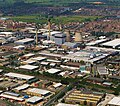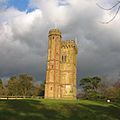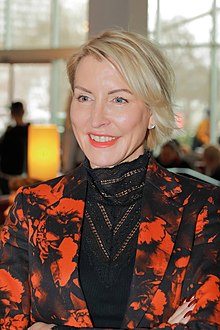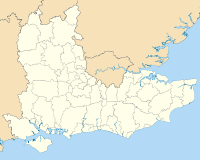Portal:South East England
The South East England Portal

South East England is one of the nine official regions of England in the United Kingdom at the first level of ITL for statistical purposes. It consists of the nine counties of Berkshire, Buckinghamshire, East Sussex, Hampshire, the Isle of Wight, Kent, Oxfordshire, Surrey and West Sussex. Cities and towns in the region include Aldershot, Ashford, Aylesbury, Basingstoke, Bracknell, Brighton and Hove, Canterbury, Chichester, Crawley, Eastbourne, Farnborough, Gosport, Guildford, Hastings, High Wycombe, Margate, Maidstone, Medway, Milton Keynes, Newport, Oxford, Portsmouth, Ramsgate, Reading, Slough, Southampton, Winchester, Woking and Worthing.
South East England is the third-largest region of England, with a land area of 19,072 square kilometres (7,364 sq mi), and is also the most populous with a total population of 9,379,833 in 2022. The region contains eight legally chartered cities: Brighton and Hove, Canterbury, Chichester, Milton Keynes, Oxford, Portsmouth, Southampton and Winchester. The region's close proximity to London has led to South East England becoming a prosperous economic hub with the largest economy of any region in the UK, after London. The region is home to Gatwick Airport, the UK's second-busiest airport, and Heathrow Airport (the UK's busiest airport) is located adjacent to the region's boundary with Greater London. The coastline along the English Channel provides numerous ferry crossings to mainland Europe.
The region is known for its countryside, which includes two national parks: the New Forest and the South Downs, as well as the North Downs, the Chiltern Hills and part of the Cotswolds. The River Thames flows through the region and its basin is known as the Thames Valley. It is also the location of a number of internationally known places of interest, such as HMS Victory in Portsmouth, Cliveden in Buckinghamshire, Thorpe Park and RHS Wisley in Surrey, Blenheim Palace in Oxfordshire, Windsor Castle in Berkshire, Leeds Castle, the White Cliffs of Dover and Canterbury Cathedral in Kent, Brighton Palace Pier, and Hammerwood Park in East Sussex, and Wakehurst Place in West Sussex. The region has many universities; the University of Oxford is the oldest in the English-speaking world, and ranked among the best in the world.
South East England is host to various sporting events, including the annual Henley Royal Regatta, Royal Ascot and The Derby, and sporting venues include Wentworth Golf Club and Brands Hatch. Some of the events of the 2012 Summer Olympics were held in the south east, including the rowing at Eton Dorney and part of the cycling road race in the Surrey Hills.
In medieval times, South East England included much of the Kingdom of Wessex, which was the precursor to the modern state of England. Winchester was the capital of England after unification of the various states, including the kingdoms of Kent, Sussex and Mercia. Winchester stopped being the administrative capital of England some time in the 13th century as its influence waned while the City of London dominated commerce. The last monarch to be crowned at Winchester was Richard II in 1377, although the last monarch to be crowned by the Bishop of Winchester was Queen Mary I in 1553. (Full article...)
Selected article
Wood Siding railway station was a halt in Bernwood Forest, Buckinghamshire, England. It opened in 1871 as a terminus of a short horse-drawn tramway built to assist the transport of goods from and around the Duke of Buckingham's extensive estates in Buckinghamshire, as well as connect the Duke's estates to the Aylesbury and Buckingham Railway at Quainton Road.
In 1872, a lobbying campaign by residents of the town of Brill led to the tramway being converted for passenger use and extended a short distance beyond Wood Siding to Brill railway station, becoming known as the Brill Tramway. The railway was cheaply built, ungraded, and used poor quality locomotives; services were very slow, initially limited to a speed of 5 miles per hour (8 km/h). In the 1890s it was planned to extend the tramway to Oxford, but the scheme was abandoned. Instead, the operation of the line was taken over by the Metropolitan Railway in 1899. Between 1908 and 1910 the station was completely rebuilt on a bridge over the newly built Chiltern Main Line of the Great Western Railway, which passed directly beneath the station.
In 1933 the Metropolitan Railway was taken into public ownership and became the Metropolitan line of London Transport. As a result, Wood Siding became a station on the London Underground network, despite being over 45 miles (72 km) from the City of London. London Transport's new management aimed to move away from goods services to concentrate on passenger services. As the line served a very lightly populated rural area, the new management believed it very unlikely that it could ever be made viable. Wood Siding was closed, along with the rest of the line, from 30 November 1935. All infrastructure associated with the station was removed in 1936; the remains of the bridge which supported the station are still in place. (Full article...)
Selected pictures
Selected biography
Heather Anne Mills (born 12 January 1968) is an English former model, businesswoman and animal rights activist.
Mills first came to public attention in 1993 when she was a model and was run over by a police motorcycle in London. The accident resulted in the amputation of her left leg below the knee, but she continued to model using a prosthetic limb and later sold her story to the tabloid journal News of the World.
She began a relationship with Paul McCartney in 2000. They married in June 2002 and Mills gave birth to Beatrice Milly McCartney on 28 October 2003. They separated in 2006, and finalised their divorce in 2008.
After her marriage to McCartney, Mills became involved in animal rights advocacy and as of 2024 is a patron of Viva! and Viva! Health. She is also vice-president of the Limbless Association. (Full article...)
On This Day in South East England
2 January:
1727: General James Wolfe was born in Westerham, Kent.
Categories
Related portals
WikiProjects
Topics
Associated Wikimedia
The following Wikimedia Foundation sister projects provide more on this subject:
-
Commons
Free media repository -
Wikibooks
Free textbooks and manuals -
Wikidata
Free knowledge base -
Wikinews
Free-content news -
Wikiquote
Collection of quotations -
Wikisource
Free-content library -
Wikiversity
Free learning tools -
Wikivoyage
Free travel guide -
Wiktionary
Dictionary and thesaurus




















































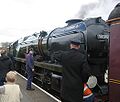







![Image 64 Credit: Michael Wilmore The Kent & East Sussex Railway was opened by Colonel H.F. Stephens, the railway engineer, in 1900. At its fullest extent, it ran nearly 22 miles[35km] from Robertsbridge on the Tonbridge to Hastings main line to Headcorn on the main line between Tonbridge and Ashford, Kent. More about the Kent & East Sussex Railway... (from Portal:Kent/Selected pictures)](http://upload.wikimedia.org/wikipedia/commons/thumb/2/2f/KentAndEastSussexRailway%28MichaelWilmore%29Oct2005.jpg/120px-KentAndEastSussexRailway%28MichaelWilmore%29Oct2005.jpg)

















